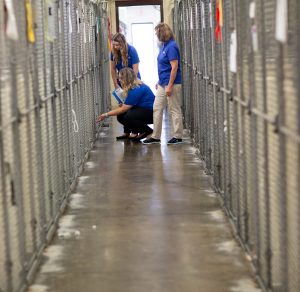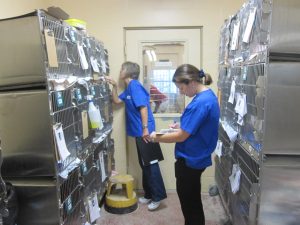Module 2: Preventive health care and health surveillance
Daily Medical Rounds
An important part of preventive health care is monitoring the health status of every animal every day, starting at intake and throughout its stay in the shelter. This monitoring is accomplished through Daily Medical Rounds. Daily Medical Rounds are a key foundation for effective healthcare management and maintenance of animal health in shelters. When properly performed, it is an efficient and effective system for monitoring individual animals. Here are the ASV Guidelines recommendations for daily monitoring.
ASV Guidelines for Monitoring Health Status
- Each animal’s individual health status is evaluated and monitored beginning at intake and regularly thereafter
- Medical rounds must be conducted daily by a trained individual in order to visually observe and monitor the health and well-being of every animal
- Monitoring includes food and water consumption, urination, defecation, attitude, behavior, ambulation and signs of illness or other problems
- Any animal observed to be experiencing pain, suffering, distress, rapidly deteriorating health, life-threatening problems or suspected zoonotic medical conditions is assessed and appropriately managed in a timely manner
The shelter should have a Daily Rounds SOP that addresses the following:
Daily Medical Rounds SOP
- Who conducts the Rounds
- When are Rounds performed
- How are Rounds performed
- What health parameters are assessed
- Who is responsible for follow-up actions
The shelter veterinarian and a vet tech can perform Daily Medical Rounds together, but it is more efficient use of resources if a trained vet tech performs the rounds to free up the veterinarian’s time for exams and surgeries.

Ideally, the Rounds should be conducted first thing every morning to observe for diarrhea, vomit, or blood in runs and cages before cleaning. If Rounds are conducted after the morning cleaning, then kennel staff should record and report any concerns with appetite, diarrhea, urination, vomiting, coughing, or sneezing that they observed.
Daily Medical Rounds are walk-through rounds – the vet tech walks by the run or cage of every animal in the shelter to observe for any health concerns in addition to the information provided by the kennel staff. They should start with healthy dogs and cats ready for adoption, followed by newly admitted animals, and then sick animals in isolation rooms last. The tech must wear proper PPE when entering isolation rooms.
The vet tech records observations in the Daily Veterinary Check List. They do not open the run or cage to physically examine the animal during Rounds unless there is an emergency condition. A thorough examination is scheduled with the veterinarian after the Rounds are completed. Tablets and smartphones can also be used for recording observations as well as pictures.
Vet techs should be trained by the veterinarian on what clinical signs to monitor for during Daily Medical Rounds. Here are some common ones:
- Not eating
- Vomiting
- Diarrhea
- Coughing/gagging
- Sneezing
- Nasal and/or ocular discharges
- Drooling
- Very lethargic or unwilling to get up
- Blood in run or cage
- Severe pruritis
- New areas of hair loss
- Digging at ears and shaking head
- Weight-bearing or non-weight-bearing lameness
- Wounds
Here are clinical signs that signify an emergency condition warranting immediate medical attention:
- Straining to urinate
- Ataxia/unsteadiness
- Seizures
- Unresponsive
- Open mouth breathing
- Rapid respiratory rate and/or dyspnea
- Choking/pawing at mouth
- Eye injuries
- Hemorrhage from nose or mouth
- Pain evidenced by restlessness, vocalizing, panting, trembling
- Pregnant animal in distress

Once the Daily Medical Rounds are completed, the vet tech meets with the veterinarian to discuss the observations and schedule exams, sample collection for diagnostic testing, etc. The observations must also be recorded in the animal’s medical record along with results of follow-up exams, diagnostics, and treatments.
In addition to monitoring for signs of health problems, the Daily Medical Rounds can be used to monitor response to treatments for current medical conditions. Alternatively, vet techs can observe treatment responses when administering medications to animals in the mornings and afternoons.
Test Your Knowledge
Review the Daily Medical Rounds SOP provided below. Select the best answer for the questions about this SOP.
Created: 2/24/21
Supplies Needed
- Daily Veterinary Check List
- Clipboard
- Pen
Procedures
- Perform Medical Rounds daily, including weekends and holidays.
- Check all animals in the shelter.
- Record health concerns in the Daily Veterinary Check List.
- Record health concerns in each animal’s medical record.
- Give the Daily Veterinary Check List to the veterinarian for determination of next steps for each health concern.

